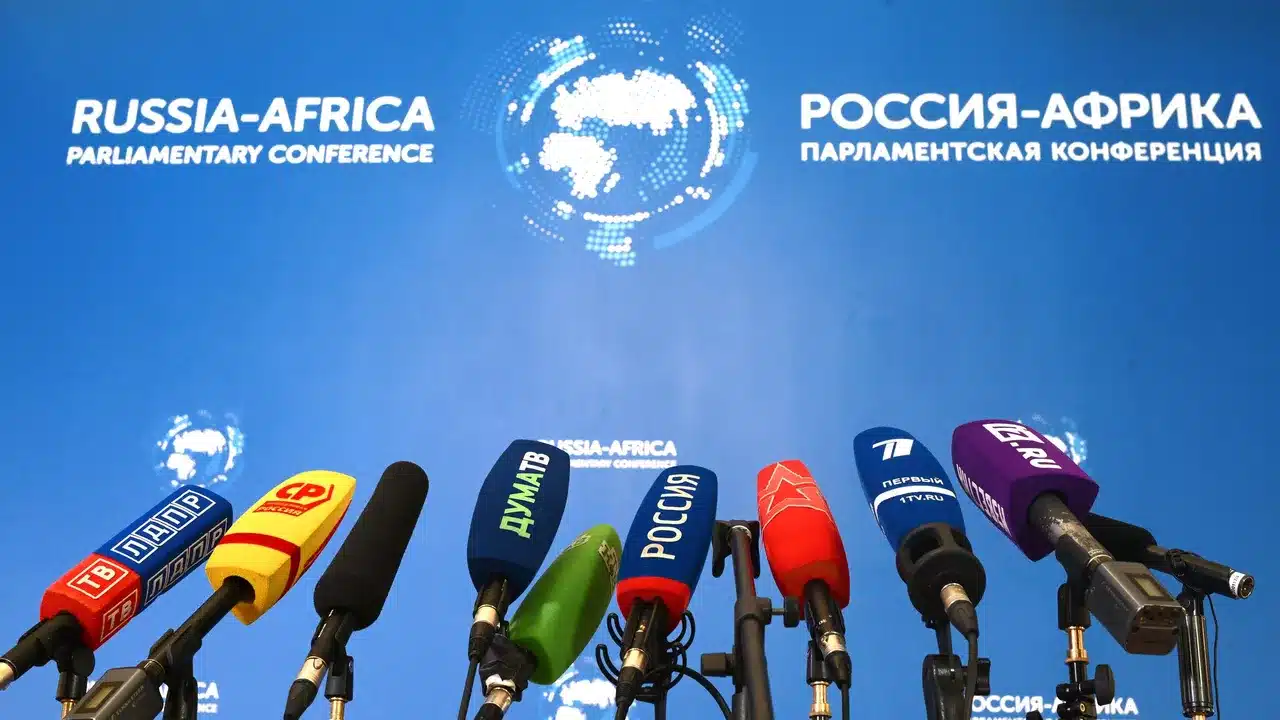
Microphones for press close-ups of the participants of the Second International Parliamentary Conference "Russia-Africa" in Moscow. Photo: Sputnik/File photo.

Orinoco Tribune – News and opinion pieces about Venezuela and beyond
From Venezuela and made by Venezuelan Chavistas

Microphones for press close-ups of the participants of the Second International Parliamentary Conference "Russia-Africa" in Moscow. Photo: Sputnik/File photo.
Guests from 49 African nations attended a two-day gathering in St. Petersburg, striking deals with Russian partners and sharing their rich culture.
Russia’s de-facto “second capital,” St. Petersburg is used to hosting large-scale international events, but this year’s Russia-Africa Summit probably saw more presidents and prime ministers at the ExpoForum than you usually see at the same venue attending the annual St. Petersburg international economic forums.
49 countries sent their delegations, with 17 heads of states traveling in person to Russia to discuss political, humanitarian, and economic issues.
Politics remained high on the agenda, as Moscow has recently been increasing its presence in the Global South, including the African continent. Russian Foreign Minister Sergey Lavrov embarked on four big trips to Africa within the past year, holding talks in Burundi, South Africa, Angola, Mozambique, Uganda, and other nations.
While many African delegations came to St. Petersburg’s Russia-Africa Summit to discuss existing joint projects with Russia, others, like Equatorial Guinea’s Minister of Mines and Hydrocarbons Antonio Oburu Ondo brought new ideas, expecting an improvement in ties with Moscow.
While Russian President Vladimir Putin was announcing from the stage of the Russia-Africa Forum that Moscow will re-open an embassy in Equatorial Guinea, Ondo was at a panel discussion on energy cooperation, describing how his nation wants to see Russian mining companies entering the market.
“With opening an embassy, everything will be really easy,” Antonio Oburu Ondo told Sputnik. He said that his nation is ready to explore joint projects in mining of gold and diamonds: “We are ready to sit down with [Russian] mining companies to see what are the opportunities.”
Many African nations are interested in the transfer of Russian technologies when it comes to conventional and nuclear energy projects.
https://t.me/geopolitics_live/2780
In South Africa, Moscow is prepared to offer solutions to the country’s energy crisis, by providing knowledge, expertise, and concession-based projects, which will put an end to load shedding – a practice that limits the growth of South Africa.
Burkina Faso’s Interim President Tells His Peers To Stop Being Imperialist Puppets
Moscow and many of its African partners also seem to be on the same page when it comes to a slow approach to the green transition.
“We could talk about transition to green energies, but it has to be just,” said Executive Chairman of the African Energy Chamber NJ Ayuk. “I wrote a book: ‘Just transition.’ Nobody wants to breathe clean air in the dark. We really have to ensure that we have the right kind of energy to make it happen.”
Besides panel discussions on energy, economy, media cooperation, education, security, and other issues, participants at the summit had a chance to explore what Russian regions had to offer, take hundreds of photos posing in national costumes, share their rich culture and traditions with each other, and with their Russian partners.
The first Russia-Africa summit, which was attended by delegations from 54 countries, was held in the Southern Russian city of Sochi in October 2019.
(Sputnik)
BLA